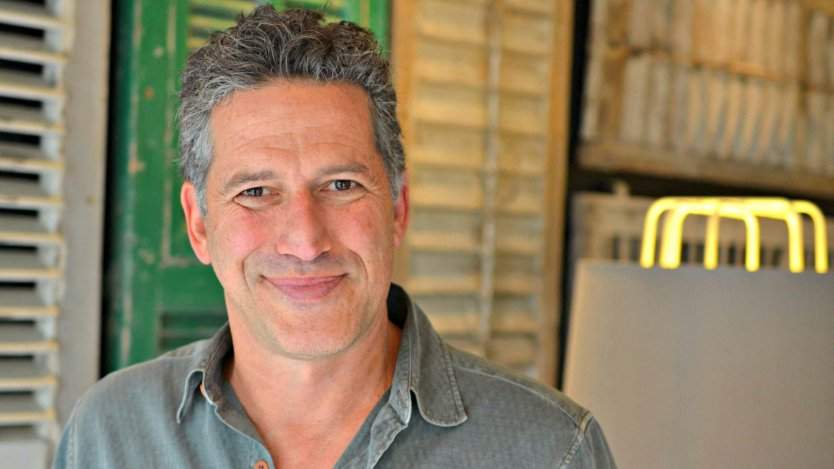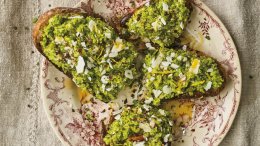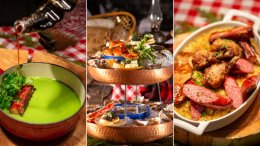I remember being fresh out of high school, living with a group of friends in a house that, looking back, was really only about 10 blocks from my parents' home, but still, it was an essential part of my early adulthood.
We didn't have a lot of money, but what we loved to do was watch Michael Smith, Anna Olson or Bob Blumer cook on Food Network Canada, paying attention to every step on the screen, mesmerized, as we sat on the couch and ate the mac 'n' cheese or cheap instant ramen noodles made in our ill-equipped kitchen, wishing we could make what they made instead.
While Smith and Olson taught us the basics to a properly roast chicken or a simple pie crust, Blumer, The Surreal Gourmet, was teaching us that it was just as important to have fun in the kitchen. Why shouldn't you make a meatloaf in the shape of a cake and ice it with mashed potatoes or add a shot of vodka (or two) to something like a tomato soup. Arguably his mantra, it was A-OK to play with your food, as long as you ate it, too.
These trailblazers have inspired me, along with a generation of home cooks and food bloggers to be more daring in the kitchen.
Recently, I sat down with Blumer to talk about everything from the ever-changing landscape of culinary programming, the overused "chef" label and what he's learned throughout his 25 year (and counting career) in the food world.
The programming for cooking television shows is insanely different now than when you came onto Food Network Canada with The Surreal Gourmet over 12 year ago. Do you watch any show now?
Well, I don’t really watch much television anymore and I do live in the States, but when I can or when I’m in Canada, I do, because I’m just curious. I heard there’s a new show called Carnival Food, which is probably just like Diners, Drive-ins and Dives, but at carnivals instead?
Why do you think there’s been such a shift from educational-oriented series to more competition- or ‘reality’-focused shows over the years?
The networks, they follow the trends in the ratings. I hate to say it, but it’s the viewers who really determine not only what goes on, but what stays on television and what the trends become. If the viewers weren’t all tuning into these kinds of shows right now, they wouldn’t be making them. You can’t really blame them because that’s what they’re in the business to do. You wish they would be a little more pioneering and maybe, you know, try to create some shows that are for a different kind of audience, but it doesn’t really work out that way.
Is that why you’ve done a few different television concepts? To evolve with the audience shift?
My first two shows ran for five seasons each. After that long, it can be bit of burnout for the audience and it’s a little bit of a creative burnout on our end, too. I mean, how many more surreal parties could I really do? But, having an opportunity to do another show [Glutton For Punishment] was kind of the best of both worlds because you keep it fresh, you reinvent yourself and you’re still on the network. Every time I’ve pitched a show, people have said, “Oh, we thought your last show was what you were all about. We’ll be surprised if you can do something different.”
Glutton For Punishment was all about diving head first into a culinary challenge, whether it was foraging morels in the mountains or rolling bagels in Montreal. How much of that was actually off-the-cuff?
It was really intense. I mean, I was actually entering every competition that you’d see on the show. The thing about GFP was that every 30 minute episode had four acts in it. With the first three acts, sometimes we would nudge the story along to create a little bit of drama or whatever, but in the fourth act, when I was actually doing the competition, whatever happened, happened. If I fell on my face when I crossed the starting line, that’s what you would see. So, there was a lot of pressure all of the time. When we finished that show, the opportunity to do a show like World’s Weirdest Restaurants, where the star of the show were the restaurants and I’m basically just the host was a nice break, for sure.
Is there anyone on Food Network Canada whose growth since the network began in 2001 catches your eye?
It was really interesting to watch Anna Olson start from auditioning for her initial job with the network. To see her go from being a somewhat tentative host in the beginning to seeing her now. She does these cookbook signings and she has people lined up around the block. Actually, I just had dinner at her house. She has amazing poise and confidence now.
I’ve met her several times. She is amazing, to say the least, and I know that her television shows are huge in Asia, which is pretty cool.
Yeah! My shows also air in Asia and I go there twice a year. I’m big in Taiwan [laughs]. I’m saying that somewhat facetiously, mostly in reference to that Tom Waits song, but I can walk down a street in Taiwan and people will ask about my toaster Caravan.
Ah yes, your airstream toaster-van from The Surreal Gourmet. Is that still parked somewhere close to you?
Yes. I created the toaster mobile as a promotional vehicle for my book, Off The Eaten Path, so it was created before that show. I bought it, I own it. My dream -- and I’m slowly trying to make this happen -- is to to plunk it down in a permanent location like the Toronto airport and set it up as a little restaurant. I’m not a restaurateur and I don’t really want to be one, but I would love to open it up in an airport or something.
Some food personalities (looking at you Rachael and Guy) have personal-branded everything. Does having your own line of kitchenware and the like ever seem like a good idea?
My problem is that whenever I’m talking about something in the food world, I’m trying to demystify things. You know, you don’t need all of this fancy-schmancy stuff. All you really need is a basic setup, some really great ingredients and you can put them together in a fantastic way. It’s really hard to preach that and then turn around and say, “But, you must buy my whatever!”
That said, I’ve done some little things, designed some aprons. Actually, in The Gladstone Hotel in Toronto, every room is designed by a different artist and I had been staying there for a long time, so I begged them to let me redesign one of the rooms.


That seems a lot more up your alley, creatively. What's in there?
I created a Surreal Gourmet suite and I built a ton of stuff. I built a wine glass chandelier, I built a Swiss cheese canopy over the bed. I designed a marshmallow pillow case, so it looks like a big bag of marshmallows, so you lay your head down on a bag of marshmallows and go to sleep. That is one thing I would love to sell; the pillows, specifically. There’s a Fruit Loops closet, a kitchenette that’s tricked out with my favourite knives, stuff like that. That was a super fun project.
You’ve been in the food world for a long time now, but you’re not a trained chef. Do you liked to be called a chef?
You’re right, I am not technically a chef and a lot of people get really fussed about [the term]. I don’t ever call myself a chef. The only time I would call myself a chef is when someone else has introduced me that way at a certain event or a culinary school when an instructor will call me a chef. It actually gets really confusing when all of these people in the world of "chefs" call me that, but then if I call myself one, I get a massive number of emails. The truth is, I don’t really care. Because of all of the fuss, I’ve decided to refer to myself as a gastronaut.
A gastronaut, I like that. I may steal it.
I’ve been cooking for 25 years. Chefs come from two backgrounds: either they go to culinary school and into a restaurant, or they start out as, say, a dishwasher and work their way up. I’d like to think that I’ve done my own version of starting out as a dishwasher and working my way up the ranks. I do stages at restaurants, I cook at a lot of events and work with different chefs. When I did GFP, that was 52 episodes, which was like going to school 52 times to learn everything you can about oysters, or uni, or whatever. So, at the end of the day, I’d rather have myself cooking dinner than some kid who just finished up at culinary school and is technically a chef. Anyway, with all of that said, I am happy just to call myself a gastronaut and let it be.
Are there any food trends that are popular now that you were a fan of earlier in your career?
That’s a good question. One thing I’ve loved that’s become more and more popular, which really encourages me, is the whole idea of foraging. I made a lunch for some winners of a fundraiser competition just a few days ago and I had just shopped at the local farmers’ market in Toronto. I had found stinging nettles, fiddleheads, chive flowers, things like that. I love the world of foraging. Now foragers are the new rock stars!
Funny you say rock stars. I’m convinced that farmers and producers are the new culinary individuals set for the limelight.
Totally, and as it should be! I’m not saying that chefs don’t deserve to be or anything, but those guys are really the unsung heros. Especially nowadays, there is way more communication between chefs and producers.
Do you think it’s a generational thing? Maybe the new wave of farm-raised kids are deciding to embrace their crops?
I think it’s kind of cool.In the old days, probably any kid whose parents were farmers would grow up and just do whatever he or she could to get the fuck off the farm. Now, I think they are seeing the respect the farms are getting and [this younger generation] are probably developing relationships with chefs in their own generation. Then, all of a sudden, it becomes a cool thing.
Any Canadian foods you miss when you’re at home in Los Angeles?
I don’t know, what can’t you get in America?
Ketchup chips! For me, the obvious answer would be Montreal bagels. Every time a place in America tries to do them, it’s never the same. No one can do Montreal-style bagels like Montreal.
Montreal bagels do kick some serious ass. So, the true Canada vs. America culinary question: Bloody Mary or Caesar?
When I grew up, we never had fish in my house. I was never a fish person. Only in my 30s did I start eating it. Now, given the option, I usually defer to seafood. Growing up, the whole notion of Caesars and Clamato was so gross to me, but now I really love them. Tastes really evolve, that’s the interesting thing. I look back to when I was a super fussy eater, especially from 10 to 16 years old, lettuce and tomato sandwiches on white bread with butter, that was pretty much it!













